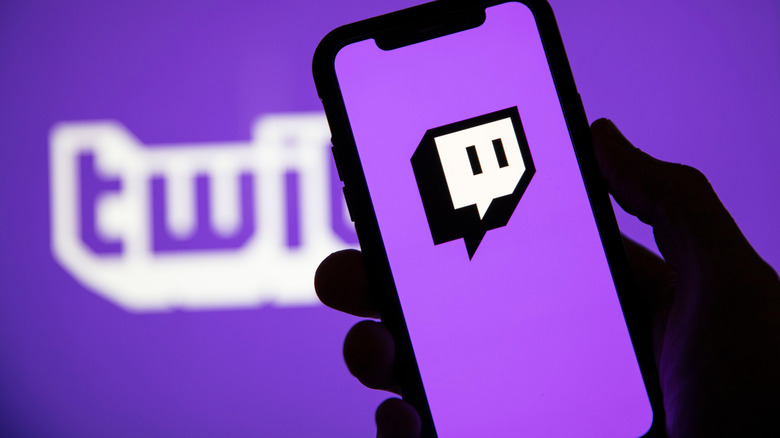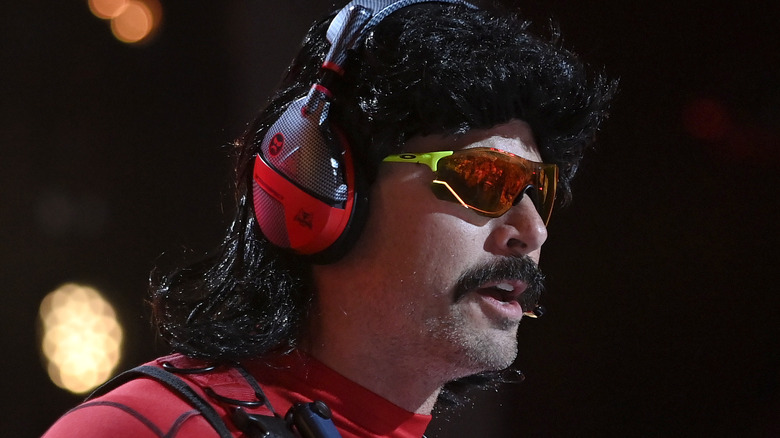Rules Every Twitch Streamer Has To Follow
Every platform has rules that protect its reputation and audience. In Twitch's case, it wants to have a functional relationship with its creators while remaining advertiser friendly. It has a wide audience with billions of viewers, so it's important to limit the amount and extent of inappropriate content that a user can see. Some of these limitations also extend to creative licenses like the DMCA, which has gotten multiple streamers suspended in the past, and problematic practices like gambling.
Twitch handles harassment on its platform with varying degrees of success. Some like Adin Ross have been banned for using slurs without much of a hassle while others needed to start an entire movement to get Twitch to break the silence on hate raids. Still, there are a few rules that it seems to have a no-nonsense handle on. Some of Twitch's restrictions overlap with other streaming sites like YouTube but still stand out as non-negotiable on the platform. Here are six rules that every Twitch streamer needs to follow.
Keep your clothes (mostly) on
Twitch has a long list of rules about "Nudity and Sexual Content" on its platform. Some things like sexually explicit acts or fully exposed genitalia have never been allowed, but gray areas like bikini streams and sexually suggestive content that could be allowed depending on the context also expand possibilities.
"Nudity and sexually explicit content or activities, such as pornography, sexual acts or intercourse, and sexual services, are prohibited," reads the Twitch Community Guidelines.
The guidelines state that bans are subject to consideration based on how suggestive the content is — like whether or not it has a "focus on breasts, buttocks, or pelvic region, including poses that deliberately highlight these elements." Twitch made the shocking decision to indefinitely suspend Amouranth during the "hot tub meta" without ever really explaining the reasoning for her demonetization. In contrast, a streamer was banned for having sex on stream – a much more clear and understandable boundary that was broken.
Respect the Digital Millennium Copyright Act
DMCA violations are one of the most common reasons for bans on Twitch. Streamers, including Twitch troublemaker xQc, have received Digital Millennium Copyright Act (DMCA) strikes in the past for streaming exclusive content. xQc received a DMCA strike from the Olympics Committee for watching the Olympic highlights with his viewers, but others have also received a DMCA strike from something as simple as playing a copyrighted song on stream.
That's why games like "Cyberpunk 2077" come with a "streamer mode" that turns off the copyrighted tracks in case content creators want to stream those games without getting in trouble. DMCA warnings upset streamers just last year after Twitch started deleting streamer broadcasts without any warning because of so-called DMCA strikes. Many streamers at the time wished that Twitch reps warned them ahead of time so that they could modify their content without it being deleted, or at least tell them what in the video triggered the strike.
"These DMCA notices are legit and apply to your old content," gaming industry lawyer Noah Downs wrote (per Twitter). "I've received word that live takedowns may be implemented very soon – this is the beginning."
Keep the violence to your games
Violence is another dealbreaker for Twitch. Some streamers have ruined their careers in seconds for abusing others on stream. For example, SmashGodxXx was banned for abusing his girlfriend while streaming, after which he forced her to deny it to appease his chat. In another instance, a streamer called MajesticUnicorn was banned for roughly handling her toddler and infant for everyone to see. Viewers even called the cops on her house for them to intervene in the child abuse.
Twitch also considers self-destructive behavior inappropriate. "Twitch does not allow content that glorifies, promotes, or encourages self-harm," Twitch writes in its guidelines. "We also prohibit activity that may endanger your life, lead to your physical harm, or encourage others to engage in physically harmful behavior." This means promoting self-harm or excessively joking about it, like in a stunt. It also apparently discourages the "glorification" of violence related to major tragedies like school shootings.
In short, Twitch encourages streamers to keep the violence in video games and stay wholesome on camera.
No double streaming on YouTube or Facebook
Twitch Partners can now livestream on other services, just not at the same time as Twitch. The company doesn't allow simultaneous streaming because it believes "engaging with two streams at once can lead to a sub-optimal experience for your community." It makes sense, considering engaging with multiple chats can be difficult to manage, but it also means streamers still can't double-stream.
According to the partner exclusivity FAQ, partners can immediately start livestreaming to a bigger platform like YouTube or Facebook once their Twitch stream ends. Short-form livestreaming on Tiktok, Instagram, and similar apps is allowed. Note that Twitch Affiliates, who are a "lower level" than partners, don't need to worry about these distinctions — presumably because of their smaller audiences.
At the time it was announced, streamers had differing thoughts that it was pointless unless you could simultaneously stream, to thinking that it was a reasonable update to the site. It also changed the streaming game for Dr Disrespect because he could possibly collaborate with his friends from Twitch again.
No more gambling (mostly)
Gambling is an addiction that many popular streamers know. Several have called on Twitch to ban gambling in the last few months, and the company finally obliged. Twitch originally only prohibited sharing links or referral codes to the sites in question but noticed streamers "circumvent" those rules.
So the platform finally enacted big changes to its gambling policy on October 18. In a snippet on Twitter, the company announced it would be prohibiting the streaming of "gambling sites that include slots, roulette, or dice games that aren't licensed either in the U.S. or other jurisdictions." It also explicitly named Stake.com, Rollbit.com, Duelbits.com, and Roobet.com in its prohibited sites list.
This callout was especially upsetting to Trainwrecks and other slot streamers, who regularly streamed Stake.com gambling on their channels. Slot streamers found a new home on Dlive amidst the gambling ban, but there still hasn't been enough time to tell if it was a wise move.






